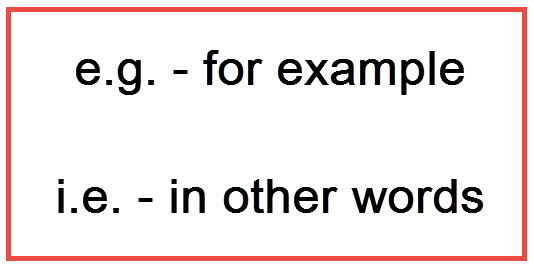The abbreviations i.e. and e.g. are both derived from Latin words. e.g. means "for example" in English and "i.e." means "in other words." In Latin, i.e. is short for "id est." and e.g. is short for "exempli gratia." The abbreviations refer to the Latin words not the English meanings. These two abbreviations are often confused with each other. They both indicate more information is coming but they have different meanings. You give examples after e.g. and you provide something specific after i.e.

e.g.
e.g. is used in writing to let the reader know some examples are coming. A memory trick with e.g. is to remember the silly words "egg sample." You can also remember e is for "example." If you are having trouble remembering you could always write out the words "for example: instead. Substituting in "for example" in place of e.g. is also a way to test if your sentence works.Example Sentences
- There are several great Marvel movies coming out this year, e.g., Black Panther, Avengers: Infinity War and Ant-Man and the Wasp.
- I was shocked by all the wild pizza toppings the restaurant had available, e.g., crab, pineapple, pastrami, sriracha, honey and blackberries.
i.e.
i.e. is used in a sentence to provide some specific information. i.e. means "in other words" or "that is." You are not providing examples with i.e. You are providing some additional specific information to the reader.Example Sentences
- Suddenly the ride became uneven and it felt like we were being pulled to the right, i.e., we had a flat tire.
- My birthday is tomorrow and I will be having my favorite meal, i.e., lobster thermidor.
Here's a helpful video with additional advice from Socratica.


